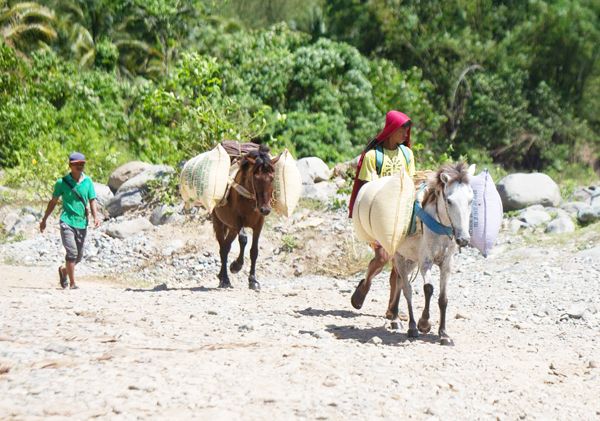DAVAO CITY – Various advocacy groups have expressed concern over the pending Indigenous Peoples (IP) Code being pushed by the Bangsamoro Transition Authority in the Bangsamoro region as it said to be far from what is being envisioned.

TEDURAY farmers haul sacks of corn in a remote village in South Upi, Maguindanao del Sur. (Keith Bacongco)
The groups issued a statement following a recent public hearing on proposed Parliament Bill No. 273 (Bill 273) or the Bangsamoro Indigenous Peoples Development Act of 2024.
While some members of the BTA are touting that the Bill 273 is set to be the enhanced version of the national government’s Indigenous Peoples’ Rights Act (IPRA), IP rights advocates believe otherwise.
Instead, advocacy groups and various IP organizations are pushing for the enactment of the Non-Moro Indigenous Peoples Rights Act (Bill 166), which embodies the genuine aspirations of the tribes in the region.
The Legal Rights and Natural Resources Center-Kasama sa Kalikasan (LRC-KsK), a policy and advocacy non-government organization, said out that there is a need for new legislation that will specifically protect the rights of Non-Moro Indigenous Peoples (NMIP) inside the Bangsamoro Autonomous Region in Muslin Mindanao (BARMM).
LRC-KsK said that there is a need to recognize the distinct identity of indigenous peoples who do not identify as Moro or Bangsamoro and are not part of the 13 Moro ethnolinguistic groups.
Thus, the IP code should uphold freedom of choice and self-ascription of NMIP, the LRC-KsK said.
It added that here is a need for a special legal protection for NMIPs due to their distinct identities, needs, and realities. "We believe this bill should be the legislation that will provide for their specific legal rights."
The advocacy group also suggested that the bill should recognize and protect NMIPs' rights to ancestral domains.
“Ancestral domains are integral to the identities of the NMIPs. Without recognition of their rights to ancestral domains, it is equivalent to denying who they are as peoples,” LRC-KsK stressed.
The group is wary that the proposal for a singular ancestral domain or a shared ancestral domain of all native inhabitants will erase the right of NMIPs to their ancestral domains.
NMIPs represent about two percent of the BARMM’s 4.4 million population and about six distinct IP groups.
Many of these IP groups are located in the hinterlands of Maguindanao provinces and Special Geographic Areas in North Cotabato.
Better than IPRA
The last leg of the series of public consultations for the Bill 273 concluded in Quezon City on May 24.
Following the consultation, Member of Parliament Ramon Piang Sr., chairman of the Committee on Indigenous Peoples’ Affairs, released a statement claiming that the proposed IP Code will provide a strong framework tailored to the region’s distinct IP needs.
Piang, a former mayor of North Upi in Maguindanao del Norte, said that the BARMM’s IP Code would become an enhance version of IPRA as it would adhere to the highest standards of inclusivity.
He added that the IP Code would also ensure that the voices and rights of indigenous communities are duly represented and protected.
The BTA is mandated to enact seven priority codes, with five already passed into law. The IP Code and Revenue Code are the two remaining codes that have yet to be enacted.
At least 10 advocacy groups expressed apprehension with the way the Bill 273 is currently formulated, particularly the shift away from the recognition of indigenous peoples’ inherent and pre-existing rights to self-determination.
“The draft law utilizes assimilationist and paternalistic language of ‘protecting’ and ‘developing’ a minority population, thereby degrading indigenous peoples to objects of governance and reducing the totality of indigenous rights to development alone,” they said in a statement.
Signatories were IP advocate Amabella Carumba, Darussalam Al-Farouq Youth Organization, forumZFD, Indigenous Women Resource Center, Learned Kagan Muslim Foundation Inc., Lumad Husay Mindanaw, Mindanao Peace People's Movement, Non-Moro Indigenous Peoples Council, Samal Island Muslim Communities Development Center Inc., Task Force Bantay Kalikasan, and Timuay Justice and Governance.
According to these groups, the transition period represents a critical opportunity to address shortcomings of the past administrations in the region and create a more robust legal framework where indigenous peoples are recognized as subjects with distinct identities.
“We maintain that recognizing indigenous peoples as subjects, rather than objects, of governance is the only way of addressing histories of colonization and marginalization."